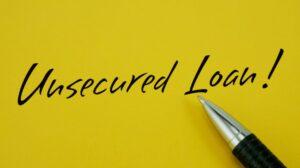
- Unsecured Loans
Unsecured personal loans offer the convenience of access to loan unsecured capital without the necessity to pledge collateral. To assess a potential borrower’s creditworthiness and determine whether they are a suitable candidate for the loan, lenders go through a loan application process, which heavily involves reviewing the applicant’s Credit history. Given rising interest rates and looming economic uncertainty, more consumers are contemplating the advantages of online unsecured loans to consolidate high-interest debts or finance substantial expenses.
The guide delves into unsecured personal loans, providing a comprehensive understanding of what is an unsecured loan, the factors in assessing when comparing secured vs unsecured loan, and useful advice and common queries. Continue reading to uncover how unsecured loans are responsibly manipulated to fit your financial strategy.
What Are Online Unsecured Personal Loans?

- How to get unsecured loans online
Known interchangeably as signature loans, unsecured personal loans are a type of financing that doesn’t require any asset as a backup from the borrower. Comparatively, home and auto loans are secured loans, as the property involved acts as collateral that the lender acquires if a default occurs. Nevertheless, with an unsecured personal loan, lenders don’t have the advantage of resorting to the borrower’s assets must they fail to repay.
Rather, the lenders analyze the applicant’s credit reports, credit scores, revenue, current liabilities, and other relevant data to infer their creditworthiness. Borrowers who showcase strong financial responsibility, signified by excellent credit scores and manageable debt-to-income ratios, are more frequently than not given the green light for substantial loans with minimal personal loan rate.
Soon after approval, the direct payday lenders proffer the complete loan proceeds in a single initial payment. As per the loan term, the borrower must make fixed monthly loan payments in a span ranging between two and seven years. The payments are directed towards clearing the principal and the interest until the loan amount is liquidated.
Unsecured Personal Loan Interest Rates with Guaranteed Approval
The interest rates levied on unsecured personal loans frequently exceed the rates for secured loans like mortgages and auto loans. It primarily compensates the lender for the added risk they undertake by lending without any collateral or personal loan requirements in place.
Here’s a guide on normal interest rate ranges for unsecured personal loans based on the applicant’s credit score:
| Credit Score | Interest Rate Range |
|---|---|
| 760+ | 5-10% |
| 720-759 | 10-15% |
| 680-719 | 15-20% |
| 640-679 | 20-25% |
| Below 640 | May not qualify |
Credit bureaus classify higher credit scores as a reflection of responsible financial decisions. Single-digit interest rates become feasible with excellent credit scores in the 760+ range. Nevertheless, borrowers with a poor credit score falling below 640 must meet the minimum credit score requirements.
The best method to secure the lowest interest rate is to explore and compare offers from multiple financial institutions instead of hastily accepting the first rate offered. It is important to recall that online lenders generally provide more competitive pricing than traditional banks. Qualifying for a lower rate over a period of time saves thousands in interest loan cost during the loan’s term.
The Pros and Cons of Unsecured Installment Loans
Unsecured installment loans offer several advantages:
Fast funding – Approval and funding happen within 1-3 business days. No appraisal is required. It makes unsecured loans helpful for pressing financial decisions or unexpected medical expenses.
Flexible usage – Borrowers have the privilege to utilize the funds for any purpose, be it consolidating credit card debt, financing home renovations, covering medical expenses, or funding a much-needed vacation.
Predictable payments – Unsecured loans have fixed monthly payments, allowing borrowers to outline their finances accordingly.
May improve credit – Timely repayment exemplifies financial responsibility and positively impacts the borrower’s credit score.
Nonetheless, potential borrowers must be vigilant of certain drawbacks:
Higher interest rates – Unsecured loan rates almost run higher when compared to secured loan types. Timely repayment, nevertheless, illustrates financial discipline and work to improve the borrower’s credit score over time.
Requires good credit – To qualify, you generally need a credit score of 640 and ideally over 680 or 700. Those needing a good credit track record do not meet the credit limit requirements and, thus, do not qualify.
Unsecured risk – The process involves the lender taking on more risk by not demanding collateral. You usually see this kind of risk in a loan agreement. Expect the potential for thorough credit checks, which present challenges for people with bad credit.
Potential predatory lending – Certain personal loan providers potentially take advantage of desperate borrowers by enforcing excessively high fees or interest rates. It is particularly applicable to credit card consolidation. It’s significant to avoid loan offers that seem “too good to be true.”
Carefully review the factors when deciding if an unsecured personal loan aligns with your financial situation and goals. The financial product offers flexibility, but the absence of collateral equates to higher rates and stricter credit standards. A personal loan calculator comes in handy in this situation to make informed decisions.
Tips for Getting Approved for an Unsecured Personal Loan with Bad Credit
To augment your approval rate and the chances of qualifying for an unsecured personal loan with advantageous terms, follow the tips outlined below:
- Check your credit reports – Confirm that no errors are detrimental to your scores. Be vigilant and dispute any inaccuracies.
- Pay down credit card balances – High revolving debt risks negatively impact your debt-to-income ratio. It is beneficial to pay off cards before applying for the loan online. It is frequently a step in credit card consolidation.
- Avoid new credit inquiries – A substantial number of new applications within a short timeframe raises red flags for lenders. It’s frequently better to properly space out loan requests.
- Provide income documentation – Have recent pay stubs or tax returns ready to validate your financial situation.
- Add a cosigner – Requesting a cosigner with a satisfactory credit score is beneficial in helping you qualify and acquire superior rates.
- Shop around extensively – Make it a point to compare offers from many online lenders, banks, and credit unions. Evaluate both rates and fees to ensure a good customer experience.
- Evaluate a secured loan – A secured loan requiring collateral is an easier alternative to gain if you have assets if your credit needs improvement. It’s a matter to assess, especially for people with bad credit.
Adequate preparation and research enhance your chances of approval. Nonetheless, ensuring that the loan aligns with your budget and that you understand the rates and terms before accepting the proposed financial products is important.
What an Online Unsecured Loan Must Not Be Used For
There are particular situations where they won’t be sensible or are not recommended while personal loan funds are put to use quite flexibly:
- Investing or gambling – It’s not recommended to approach personal loan lenders for speculative investments or gambling. Losses cause the debt to balloon quickly, making it unmanageable.
- Recurring expenses – Regular monthly expenses, such as rent and utilities, must not be covered by unsecured debt consolidation loans. These loan options normally have short-term repayment terms.
- Luxury purchases – Show extreme caution when reviewing borrowing for lavish discretionary purchases from personal loan providers, especially if you cannot afford the repayment. Even if approved, recall to evaluate your borrowing limit keenly.
- Paying off other loans – Transferring debt from one unsecured loan to another risks creating a vicious cycle of debt. It must be avoided unless debt consolidation loans are availed at significantly lower rates.
- Businesses without collateral – Unsecured financing is normally an option for personal needs, not business financing unless business assets are pledged. For businesses, seek lines of credit for better flexibility.
Thinking analytically about why you need funds and choosing from the various loan options is prudent. Personal loan lenders conduct Soft credit inquiries and offer Competitive rates, but the potential downsides of high interest and strict approval requirements make them best suited only for certain circumstances when having to deal with a financial emergency.
Unsecured Personal Loan Statistics and Trends for Direct Lenders
Unsecured personal loans have experienced a surge in popularity over the last decade. Here’s a look at certain noteworthy statistics and trends:
- Over 22.7 million consumers held unsecured personal loans from personal loan providers as of Q2 2023, up from just 14.1 million in 2017.
- The total balance of unsecured loans reached a staggering $232 billion in Q2 2023, which has more than doubled since 2017.
- The Maximum loan amounts hit a recent peak of $8,098 in Q2 2022 before tapering off slightly to $7,882—above the Minimum loan amounts—in Q3 2022.
- As borrowing increased, unsecured loan delinquency rates have risen from 2.49% in 2017 to 3.62% in Q2 2023.
- Fintech lenders, which frequently offer automatic payments and lack a prepayment penalty, now issue 71% of unsecured personal loans. This contrasts with just 25% from national banks. Though online lenders process loans faster, they charge higher fees.
- A growing trend of refinancing is evident, with 37% of Q2 2022 loans applied towards settling existing debt instead of financing new purchases.
The rise of unsecured borrowing exemplifies that this adaptable financial tool is becoming a permanent part of our economic landscape. Nevertheless, it’s significant for consumers to assess the potential pitfalls, cautiously choose a reputable lender, stick religiously to their budgets to prevent delinquencies and think about the different types of credit available.
What Are Alternatives to Unsecured Installment Loans with No Credit Check?
Beyond unsecured loans, there are several other financing options to be reviewed, including:
- Credit cards – A credit card must be a good choice to avoid interest if the balance is paid off within the 0% APR window. Nevertheless, be alert that high revolving balances result in substantial interest charges.
- Equity loans, frequently known as home equity loan – Uses the existing equity in your home by offering competitive interest rates, as your home acts as collateral. Nonetheless, you must recall that closing costs apply.
- Auto title loans – Your fully paid-off vehicle is used as collateral. The interest rates are extremely high compared to regular auto loans, while the application process offers fast approval.
- 401(k) or IRA loans – The option allows you to borrow against your retirement savings balance. There’s no need for a credit check, but you lose the growth on the withdrawn amount. You incur penalties if your employment is terminated.
- Student loans, specifically private student loans – These help cover the cost of education beyond what’s available from federal loans or financial aid. Nevertheless, they frequently require an established credit history or a cosigner with good credit.
- Same-day funding – A new loan available from certain lenders. The option assures immediate access to cash when you need it the most.
- Bad credit loans – Unsecured loans for people with low credit scores. They offer a variety of loan amounts but have higher interest rates since you’re seen as a higher risk.
- Soft credit check loans – A unique lending option for people who want to avoid a hard credit pull. Notably, this won’t impact your credit score.
- Peer-to-peer lending – Allows you to borrow from private investors. It’s particularly suitable for people with fair credit scores, albeit with fewer consumer protections.
- Payday loans – Arguably, a risky proposition is short-term loans with significantly high-interest rates that lead to a debt cycle if not handled wisely. It must be assessed only as an absolute last-resort option.
Check your financial standing, the purpose for which you need funds, your annual income, and your credit history to ascertain whether an unsecured personal loan or certain other financing tool makes the most sense for you or if leaning on savings is a better approach.
Frequently Asked Questions About What is an Unsecured Loan with Guaranteed Approval
What credit score is needed for an unsecured personal loan?
Most lenders require a minimum credit score ranging from 640 to 680 for approving an unsecured loan. Credit scores of 720 and higher qualify for the best rates. On the flip side, individuals with low credit scores below 640 probably need to be approved.
How much do I borrow with an unsecured personal loan?
Loan amounts generally radiate in the ballpark of $1,000 up to $100,000. Nevertheless, the sum approved hinges on a couple of elements, such as your monthly income, existing financial obligations, and credit score. It boosts your chances of getting a nod for a more sizeable current loan if your credit score is soaring.
Where do I get an unsecured personal loan?
In your quest for an unsecured personal loan, review your popular lenders. You have the liberty to file your application when selecting a lender, regular banks, and credit unions. The beauty of online lenders is they have a knack for approving loan applications faster and processing the loan funding in no time. Nevertheless, brace yourself for relatively higher charges. Traditional, brick-and-mortar financial institutions are a good idea, especially if you have an impressive credit score and already have an established banking relationship.
Does an unsecured personal loan hurt my credit?
An unsecured personal loan dents your credit score only if you find yourself in quicksand due to late monthly debt payments resulting in delinquency or refers you to debt recollection agencies. Nonetheless, as long as you’re punctual with your payments on time, an unsecured loan must highlight your ability to manage your credit responsibly and progressively inflate your scores.
Are unsecured personal loans tax deductible?
No, unluckily, unsecured personal loans used for personal expenses don’t have any tax benefits. The tax privilege only applies to particular types of debt, such as home mortgages and student loans. You deduct the interest you pay from your taxes if you qualify.
Do I get an unsecured business loan?
Generally, that’s a no. Unsecured payday loans are easy to access, specifically earmarked for personal home-related expenses, and will only get the green light to bankroll a business if business valuables are pledged as collateral. Alternate options you assess include business credit cards or loans guaranteed by the Small Business Administration (SBA).
What are the repayment terms on unsecured loans?
The repayment terms on unsecured loans land between 2 and 7 years. A longer duration shows flexible options with time payments that are slightly lower monthly but with a higher cumulative interest cost. For this reason, think long and hard about the repayment term you comfortably manage within your budget.
Key Takeaways on Secured vs Unsecured Loan Options
- Unsecured personal loans don’t ask for collateral, which means your eligibility is gauged by your creditworthiness instead of your assets. Robust credit scores swing the pendulum your way to lower interest rates.
- Interest rates are generally steeper than secured loans. Still, the unsecured personal loans give you the power to use your funds for any personal need, such as consolidating debt or renovations, providing the same day if necessary.
- Review the benefits, such as fast approval, predictable payments, and no credit check, along with certain drawbacks, including potentially high rates and being weighed as high risk, before submitting your loan documents.
- Improve your chances of guaranteed approval by checking your credit reports, reducing debts, and thoroughly comparing various offers. Guarantee to gain access to funds the day after approval to maximize the benefits.
- Borrow responsibly by refraining from using the funds for investments or luxury purchases and being consistent with your on-time payments. Don’t forget being restive with your spending leads to augmented funding times.
- Ponder other options like credit cards, retirement account loans, and home equity loans to determine the most suitable option for your circumstances.
You enable yourself to make the most sensible decision attainable to cater to your financial requirements and goals by thoughtfully weighing the consequences of assuming unsecured debt. An unsecured personal loan is the right answer – but you must go in with full comprehension and awareness.
